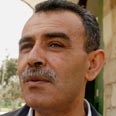
Arab MKs in Syria: Assad wants peace
MK Jamal Zahalka convenes with Syrian president in Damascus, believes Assad aspires for peace. Zahalka compares visit to enemy state to journalistic work outside of Israel
Knesset Member Jamal Zahalka (National Democratic Assembly) said Tuesday following a meeting with Syrian President Bashar Assad, that according to Assad "Syria adheres to the strategy of peace on the basis of the Arab peace initiative."
Speaking with Ynet from the presidential palace in the Syrian capital, Zahalka reported of the meeting he and the four other members of the Israeli delegation, including NDA's three MKs, held with Assad during their highly-controversial visit.
"We heard from the president that despite Syria's criticism of Resolution 1701, it encourages nations to take part in the UNIFIL forces designated to deploy south of the Litani River. The Syrians believe that a deployment of the UN forces and the Lebanese army in the area can prevent a second round of fighting in Lebanon, especially when it comes to Israel," he said.
When asked whether Syria seeks to make peace with Israel, or go to war against it, Zahalka stated: "Assad said that Syria's stances are known to all, and that he sees no shift on Israel's behalf that takes the shape of a willingness to negotiate." According to the MK, Assad believes that it is the Unites States that prevents Israel from going into negotiations.
Zahalka added: "We also heard from the president's deputy, Farouk al-Shara and others, that Syria does not want war, but peace and a settlement. However, it will not accept any deal, only a deal founded on the Arab peace initiative."
International involvement
The Arab MK also said that according to al-Shara, the international community must act in this direction to promote negotiations.
“The Syrians believe the war in Lebanon may have been prevented if Israel would not have discontinued the talks in 2000. We heard from al-Shara that Syria is not interested in war, but in a just peace,” he said.
Zahalka added that there are vast diplomatic operations being undertaken by European representatives along the Beirut-Damascus route, pursuant to the war in Lebanon, although these operations are unrelated to political processes concerning Israel.
At the time the MKs met the Syrian president, exchanges of fire took place nearby as a terror cell tried to strike the US embassy in Damascus. "I heard about it directly after our meeting. The incident apparently occurred right as we left, when we were in the car on the way back. To my understanding, Syrian security forces are investigating the issue."
The MK added that Assad is updated regarding the Palestinian arena and the creation of a unity government. "President Assad told us that he has direct contact with Abu Mazen (Palestinian President Mahmoud Abbas), who called and informed him of what was happening."
Did you bring up the issue of the captive soldiers during your visit?
“No one asked us to bring up the issue. Our position is that swift negotiations on this issue should be held. We did not bring up the issue because it wouldn’t be relevant to bring it up so long as there are international efforts being made. Therefore, what would we have to say on the subject? We have no right to deal with the issue until we are approached.”
With regards to the committee members’ feelings on their visit to Syria, Zahalka explained that, legally, they were participating in political activity under the umbrella of immunity each MK is granted.
“We don’t need advice from Bar-On or Effie Eitam. We have relations with Arab states on a regular basis and no one asks us what the purpose of our visits is. It is only when we visit Syria that everyone makes a big deal. Two weeks ago, journalist Ron Ben Yishai visited Beirut, on journalistic assignment. Political assignment is just as important as journalistic assignment, especially if our messages prevent war and advance peace.”
Zahalka says the committee will continue to meet heads of Syria until the end of the week, when it will return to Israel. It has no intention of meeting with Hamas officials in Damascus.
“We estimated that the aggressive policies failed, along with the Oslo Stage policies, the Camp David policies, and unilateral policies as well. The Arab peace initiative should be taken as a basis for negotiation to speak to the Palestinians and Syria, and that is what the Americans are trying to prevent Israel from doing,” he said.










